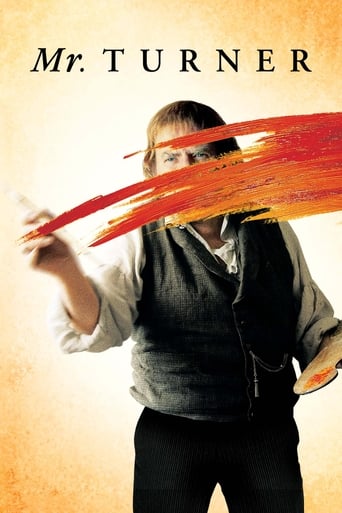

Not usually a fan of Mike Leigh's work, but thoroughly enjoyed this film, which is slow-paced & impressionistic, with distinct scenes that seem apparently unrelated, but which harmonise into a whole. Leigh's film echoes Turner's approach to art: both take an unorthodox approach. Leigh's film does not possess a linear narrative, but is a series of impressions that hang together (like pictures in an exhibition) to form an organic whole. A cynic might wonder if Leigh views himself as a latter day incarnation of Turner as an artist (misunderstood).The film (three hours) is structured around Turner & his relationships, firstly with his beloved father & loyal maid-servant Danby in London; secondly with a landlady he meets on his painting trips to the Kent seaside; & the final strand, about the ageing painter with his contemporaries, nascent art criticism (Ruskin's intellect contrasts with Turner's intuitive, instinctual approach), with the public (ridicule) & royalty, a man seemingly out of touch with new movements (the pre-Raphaelites) , fearful of being forgotten though still retaining faith in his own distinctive artistic vision ('it will come': understanding), whose genius is appreciated by the few (the compassionate doctor), a man ahead of his time anticipating the new French art movement to come.The film is the study of an inarticulate man but one with a very deep instinct & artistic vision, a man fuelled by both a passion for art & the sensual. There are echoes of Hesse & his multiplicity of selves, in the way Turner is a man both of sublime vision but also of powerful sexual drives (his sexual exploitation of his long-suffering maid-servant). He is a visionary but also a loving son, socially awkward, moody & grunting assent yet capable of deep feeling & passion (his faltering yet moving rendition of Purcell). These multiple personalities are reflected in how those around him address him: to his father & estranged mother of his children, he is simply 'Billy', to his contemporaries (Constable) 'William' & 'Turner' & in the upper echelons as 'Mr Turner'.'Mr Turner' is also about his relationship with those around him, in particular, his beloved father, 'Daddy', Mrs Booth, the landlady with whom he finds content & loving understanding of the whole man, the unfortunate Danby, loving but neglected & Benjamin Haydon, a fellow artist.This artistic relationship provides a fascinating strand to the story & a real undertow of tragedy for we know history saw Turner vindicated, but what happens to the artist who is mediocre & whose sacrifice proves vain? Haydon, too, is a man of passion, anarchic, angry at being derided & whose outbursts provide vitriolic black humour. He is, sadly, a rebel without a cause. (Researching Haydon's life following the film, he committed suicide. Dickens, usually so compassionate in his books, made a caustic appraisal of Haydon's work).Both Haydon & Turner are marginalised & misunderstood by their contemporaries, though one is ridiculed for a lack of talent ('Self portrait of an ass'), the other for being innovative, respected but regarded as veering off into his own eccentric direction (the scene in the RA where he apparently ruins a picture, but then smears over the paint). Such relationships throw a kind of chiaroscuro, light & dark, (tonal contrasts) over proceedings so that we see Turner in different kinds of light (light being central to his work as an artist). Turner's talent allows him to flit between the social worlds of aristocratic salons & the brothel.Thank heavens for Film4 +1 as one scene completely left me befuddled & yet after watching it again, this challenging scene is probably the emotional key to understanding the film & the man. This is the scene with the experiment regarding colour & light undertaken by Mary Somerville (Lesley Manville), a scientist. The experiment about the magnetic pole & spectrum of colours reflects both Turner's personality (artistic, sexual, a man of contradictions) & the impressionistic nature/vision of the film itself, contradictory elements that harmonise into a whole. It is also a scene where the normally inarticulate Turner is voluble as if the nature of science justifies his vision of art, of capturing light & shade.The final scene, of the artist out in the open air as seen through the loving eyes of his companion harks back to the opening one set in the dusk of the Dutch countryside, of a free spirit out in the open air.
... View MoreThe Bad Either I am watching an attempt at an accurate biographical account or I am not. Leigh inventing a story line that traduces Turner's character because it "felt right" is an important step too far. Not that he appears to have been a saint. Turner was sacrificed for Leigh's craft. It also did not tell a tale, more a series of barely related events, which themselves were not followed up eg. Haydon. Turner's father looked in some ways younger than Turner with more of a twinkle in his eye, so a very questionable portrayal. I also could not hear what was being said at the beginning of the film; maybe this was intentional but let's have a few subtitles to poke fun at this stupidity. The Good. Beautifully shot and great atmosphere.
... View More..so sorry I have started to see this movie... I love Turner's paintings. I have an album with his paintings since I was a child. Later in life I had the opportunity to see some of his paintings in National Gallery..I watch on reproductions of his work online any time I can...I understand he was a human being with all pluses and minuses like any other person. I didn't expect this movie to praise him as a perfect hero, but I didn't expect I will stop watching with disgust ( I didn't resist watching all of it). Honestly, the actor reminded me too much of his character played in Harry Potter movies - I avoided to watch his face because I couldn't see him as "Turner". More, his pouting and grunting didn't help at all.. The movie is like a series of postcards from different places in his last part of life, with no connection between them, with characters and long dialogues which bring no relevance to the action. Apart of the disgusting sexual behavior of "Turner" with his semi- retarded servant with a skin disease ( I don't know why this detail was emphasized so much..), I haven't learned anything about him, his art, about his amazing pictures...The pig head episode, too much detailed IMHO, was also not relevant to Turner art...Because the reason of his fame is his art, isn't it? He might not have been the nicest person bur his art brought and still brings a lot of joy to people's souls... Watching this movie, depicting a grumpy, disgusting old man was the biggest waste of my time.
... View MoreAnother reviewer of this title claims that the problem with this film is that there is no plot. I don't agree. Do our lives have plots? Do the lives of famous people and artists have plots? Did Glen Miller really spend the majority of his life seeking a sound? I may be wrong but it seems to me that what Mike Leigh has done here is exactly what the complainer says he has, namely assembled a series of realistic scenes from Turner's life and let the audience decide what is the plot, if there is indeed one. My thoughts were immediately what is this film saying about the motivation of an uncouth man to create paintings constantly? Did he sense in the late 18th century and early 19th century that art wasn't just a case of seeking the approbation of his contemporaries? He clearly had an eye on his contemporaries, with the story of the red spot on his painting that referred to Constable's work hung next to his. His charity towards Hayden. He clearly enjoyed the camaraderie of his fellow academicians but what did he really think about their work? Then there was his attitude to women. His ex partner, who bore him two sons, his housekeeper who he used without any care, the attitude to the young prostitute and finally his obvious affection for Mrs Booth. All told as a film it was never going to be a modern thriller, but was it as cerebral as it would like to be? Yes I think it was. I'd be interested to see if others saw different narratives in this wonderfully shot and marvellously researched film?
... View More